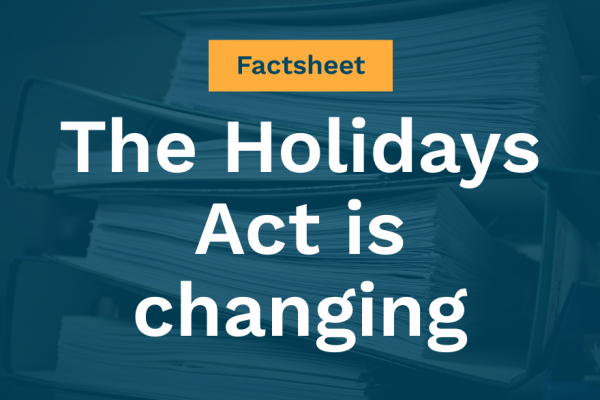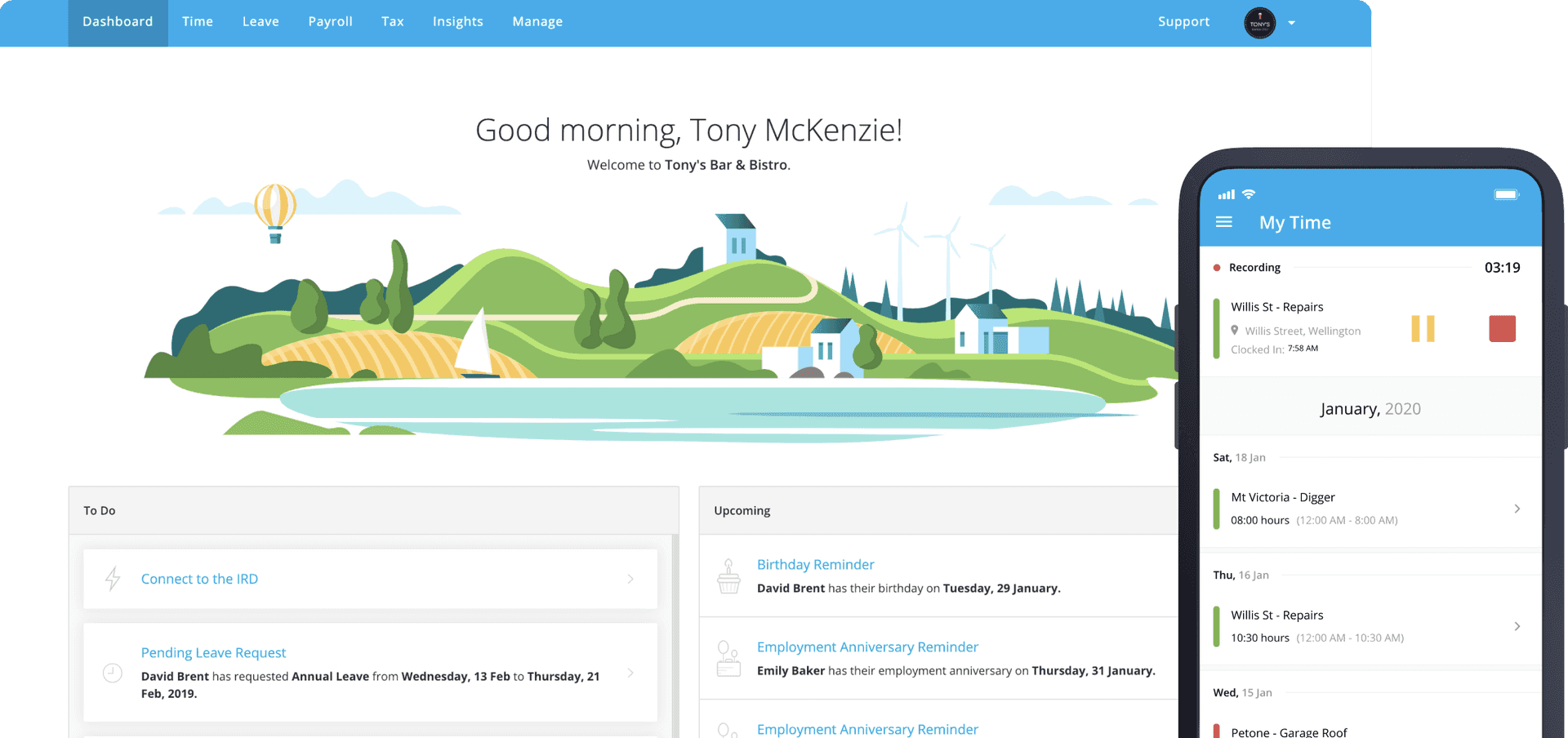Holidays Act
FACTSHEET: The Holidays Act is changing. Here’s what you need to know.
May 10, 2023
Note: This article was written in 2023 under a previous round of proposed reforms. The Government has since confirmed major policy decisions in 2025. For the most up-to-date information, please read our latest article about Holidays Act Reform which includes hours-based accrual, 12.5% casual leave compensation, and new public holiday rules.
In case you missed it, a major overhaul of the Holidays Act 2003 is currently underway.
The Government has accepted the Holidays Act Taskforce’s 22 recommendations, which aim to improve the tricky legislation and provide greater certainty for employers and employees.
Changes are wide-ranging and include a new 13-week review period option for annual holiday payments, earlier eligibility for sick and bereavement leave, and a specific provision for leave to be taken in advance.
The Taskforce was established in 2018, following a joint request from Business NZ and the Council of Trade Unions.
Minister of Workplace Relations and Safety Michael Wood said “the changes put forward by the Holidays Act Taskforce will make it easier to calculate entitlements and pay, giving employees and employers certainty and transparency. Business and union representatives reached consensus on these changes and we are delivering on our election commitment to implement them.”
It’s important to note that the Holidays Act review is still a work in progress, and the legislative changes have not yet come into effect. In the meantime, employers must continue to pay their employees based on the current Act and remediate any historical underpayments.
What is the Holidays Act?
The Holidays Act (2003) is a fundamental piece of legislation that covers leave entitlements for all employees working in New Zealand and ensures they are paid accurately and on time.
Understanding the entitlements outlined in this legislation is critical for New Zealand employers to ensure they accurately comply with requirements. Widespread problems with Holidays Act compliance have hit the news over the years, with large organisations and government agencies paying out millions to employees to cover historical underpayments.
According to MBIE, the changes aim to address the high degree of ambiguity of the wording in the Holidays Act, which has made it difficult for New Zealand employers to decipher and implement. With the amended legislation, the government is intending to increase transparency and clarity for both employees and employers.
When is the Holidays Act Changing?
The Government intends to introduce legislation that will implement the recommended changes to the Holidays Act as soon as practically possible.
While there is no exact date set for the Holidays Act changes, MBIE is working towards a mid 2023 introduction of the bill. The Select Committee process will then follow the introduction and first reading stages. However, with the end of a parliamentary term on the horizon, it is unlikely we will see the bill passed in 2023.
What are the main accepted changes to the Holidays Act?
In 2019 the Taskforce made 22 recommendations to the Holidays Act, all of which were accepted by the government in 2021. The following changes are likely to have the greatest impact on New Zealand business owners and employers.
How holiday leave payments are calculated
Current Act:
Holiday leave payments are paid at the greater of:
Ordinary Weekly Pay (or average weekly earnings over the last four weeks if this cannot be calculated).
Average weekly earnings over the last 12 months.
There is a lack of clarity around what payments are included in ‘gross earnings’ (e.g. what a discretionary payment is).
To calculate FBAPS leave payments (Family violence leave, Bereavement leave, Alternative holidays, Public holidays, Sick leave), Relevant Daily Pay (RDP), or Average Daily Pay over the last 52 weeks is used (if not possible to calculate RDP or if pay varies within the pay period).
Proposed Changes:
There will be a new 13-week calculation for average weekly earnings. Annual holidays will need to be paid at the greater of:
Ordinary Leave Pay (what the employee would have earned if they had been at work on the day(s) in question)
Average weekly earnings over the last 13 weeks
Average weekly earnings over the last 52 weeks
A clearer definition of ‘gross earnings’ will mean all cash payments received, except direct reimbursements for costs incurred. This means that even Christmas bonuses will have 8% holiday pay applied and will impact leave rates.
FBAPS (Family violence leave, Bereavement leave, Alternative holidays, Public holidays, Sick leave) leave types will no longer use Relevant Daily Pay or Average Daily Pay over the last 52 weeks. Instead be paid at the greater of:
Ordinary Leave Pay
Average Daily Pay over the last 13 weeks
How deduction of the entitlement is calculated
Current Act:
Annual holiday entitlement of four weeks, but it lacks detail about how to determine what a week is, where it is not obvious (e.g. for an employee with variable hours and/or pay). The employee and employer must agree on what genuinely constitutes a working week for the employee.
FBAPS Leave is deducted in days (but lack of certainty about how to determine if a day is an Otherwise Working Day).
Proposed Changes:
Annual holidays entitlements will continue to be calculated, taken, paid and held in weeks or portions of weeks only.
There will be a definition of how to determine what a week is for annual holidays entitlements for employees that work variable hours. Where hours are not specified in an employment agreement or roster, a week will be determined based on the average hours worked over the last 13 weeks. This is a complex calculation that will require a detailed review of 13 weeks of timesheets.
Detailed formula will be introduced for determining an Otherwise Working Day.
Days of FBAPS leave can be deducted in days or part-days (sick and family violence leave can be taken in units of less than a day, at a minimum of a ¼ of a day).
Taking annual holidays in advance
Current Act:
Employees become entitled to four weeks’ holidays after 12 months of continuous employment. The Act does not specifically accommodate leave in advance but may be taken at the employers' discretion.
Proposed Changes:
Employees will be able to take annual holidays in advance on a pro-rata basis. This is currently common practice, but there is no specific provision in the Holidays Act for leave in advance so it is at the discretion of the employer.
Eligibility for FBAPS
Current Act:
Employees are eligible for sick, bereavement and family violence leave after six months of continuous employment.
Employees are only entitled to three days of bereavement leave if their spouse or partner, parent, child, sibling, grandparent, grandchild, or spouse or partner’s parent dies.
Proposed Changes:
Eligible employees will be entitled to bereavement leave and family violence leave from their first day of employment.
Eligible employees will be able to take one day’s sick leave from their first day of employment, with an additional day given per month until the minimum entitlement is reached.
Bereavement leave will be extended to cover a wider range of family members, including cultural family groups and more modern family structures.
Pay-as-you-go (PAYG)
Current Act:
There is confusion as to what ‘intermittent or irregular' means for employees to receive annual holiday pay with their pay (instead of taking paid time off).
Proposed Changes:
There will be clearer guidelines about which employees are entitled to receive Holiday Pay-as-you-go, including a definition of what ‘intermittent or irregular’ means.
Employers will be required to review PAYG employees every 13 weeks to check their eligibility for PAYG.
Employers will no longer be able to pay PAYG for employees on fixed-term contracts of less than 12 months.
Parental Leave
Current Act:
Annual Leave which becomes due during Parental Leave or in the 12 months following Parental Leave is paid at the employee’s Average Weekly Earnings (AWE). This Parental leave ‘override’ is to account for their extended absence, which will be reflected in lower than usual AWE.
Proposed Changes:
The current parental leave ‘override’ will be removed to address discrimination against parents who take time off to care for their young children. Removing this provision will mean that employees returning to work following parental leave will be paid at their full rate for annual holidays.
Payslips
Current Act:
There is currently no legal requirement for employers to provide payslips to employees in New Zealand.
Proposed Changes:
Payslips will be required, with a significant amount of detail, so employees know what their used and remaining leave entitlements are, and how these were calculated.
What are the next steps?
The Minister has promised that after the legislation is enacted businesses and employers will be given plenty of time and guidance to prepare for the changes. But it may be some time before we see any of these changes, so until then it's a good idea to understand how they will affect your current business processes in terms of employee leave and pay.
If your business has the resources with dedicated payroll staff, familiarising yourself and utilising resources to get fully across the changes means less panic and stress later.
For smaller businesses, the easiest thing to do to get across the changes and save yourself time down the track is to make sure you’re using a cloud-based payroll system that will be able to implement the changes without any business disruption.
How are the changes being implemented in PayHero?
We’re keeping a close eye on developments and assessing what changes will be required to PayHero. All NZ payroll systems will need to make some changes. Some payroll systems (like PayHero) will only require minimal changes and others will need a complete overhaul.
PayHero has a big headstart over many other payroll systems as it already stores annual leave balances in weeks and gives you the ability to record timesheets to keep track of changing employee work patterns. We also have a review period built into PayHero, so it will be easy to implement the new 13-week review period for annual holiday entitlements and Average Daily Pay.
As and when the Act does change, PayHero will be automatically updated behind the scenes to ensure that our customers stay compliant without having to do any additional work.






